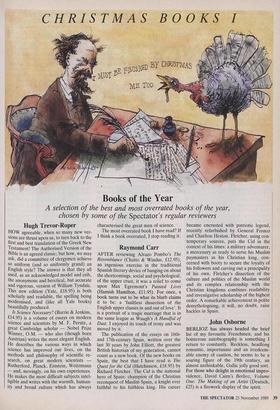Raymond Carr
AFTER reviewing Alvaro Pombo's The Resemblance (Chatto & Windus, £12.95), an ingenious exercise in the traditional Spanish literary device of banging on about the shortcomings, social and psychological, of the upper crust, it was a relief to come upon Max . Egremont's Painted Lives (Hamish Hamilton, £11.95). For once, a book turns out to be what its blurb claims it to be: a 'faultless dissection of the English upper classes in and out of love'. It is a portrait of a tragic marriage that is in the same league as Waugh's A Handful of Dust. I enjoyed its touch of irony and was moved by it.
The publication of the essays on 16th- and 17th-century Spain, written over the last 30 years by John Elliott, the greatest British historian of my generation, cannot count as a new book. Of the new books on Spain, the best that I have read is The Quest for the Cid (Hutchinson, £18.95) by Richard Fletcher. The Cid is the national hero of Spain: champion of the Christian reconquest of Muslim Spain, a knight ever faithful to his faithless king. His career became encrusted with patriotic legend, recently refurbished by General Franco and Charlton Heston. Fletcher, using con- temporary sources, puts the Cid in the context of his times: a military adventurer, a mercenary as ready to serve his Muslim paymasters as his Christian king, con- cerned with booty to secure the loyalty of his followers and carving out a principality of his own. Fletcher's dissection of the culture and politics of the Muslim world and its complex relationship with the Christian kingdoms combines readability and investigative scholarship of the highest order. A remarkable achievement in polite demythologising, it will, no doubt, raise hackles in Spain.










































































 Previous page
Previous page